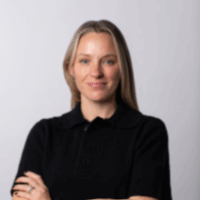A cross-section of Germany’s top service providers was asked some tough questions at DIMA ’99 yesterday, not the least of which was this: What are you doing to avoid obsolescence in an online world?
Though all have embraced e-commerce to a degree, not all of these old-line firms seem comfortable with it. The moderators made them squirm with an irreverence not often seen in the United States.
Some, like Deutsche Post, seem to get it, although moderator Rudolph Attlfellner, editor of the W & V new media report, observed that the name Deutsche Post is hardly synonymous with speed. The postal giant has jumped into the online service business with its Evita.de project.
Many companies offer warehousing and related services for online marketers, but “Evita.de goes one step further,” said Dr. Martin Raab, of Deutsche Post AG. “It will show you products to promote the growth of e-commerce.”
Attlefellner asked “how does a civil service make a new start to position itself as a service provider?”
“You don’t do it by telling a 50-year-old civil servant to do a startup,” Raab answered. “We have staffed our startup with outside people.”
AZ Bertelsmann Direct, a service bureau and data provider, is more conservative, at least judging by the remarks of Dieter Schefer, a top executive. Co-moderator Patrick Palumbo, vice president of Deuscher Direktmarketing of Verband (DDV) tweaked him by asking “What about the courage of Deutsche Post?”
“We have to be careful,” Schefer said. “We have to use our finances wisely, and not put all our eggs into one basket. We are not playing roulette.”
And why not? “AZ does not have the money to do it on its own,” Schefer said. “But look at [our parent] Bertelsmann. I am surprised at the amount of money being spent on the Internet.”
The moderators then turned their attention to Schober Firmenadressen, a rival service bureau and data provider. They asked if Schober sells names and addresses via the Web.
“In the U.S., the active shopper is one of the most important addresses,” said Werner Maier of Schober. “In Germany, we are more limited [because of restrictive legislation]. We are interested in content, but it is not about addresses-it’s about information. You can do excellent market research [on the Internet].”
How many active online buyers are available? “In the business segment, there are 200,000 companies with active addresses,” Maier said. Schober has about 50,000 “and the number increases every month by 15,000.”
If Deutsche Post is not synonymous with speed, then panel member BBDO is hardly synonymous with e-commerce, Attlefellner said. “Isn’t there a credibility problem?” he asked.
“Our house is a classical agency, with a ‘dot com’ group, with a brand management subheading,” said Christoph von Dellinghausen of BBDO Interactive. He admitted that “the core group will have to pay more attention to it in the future. What is missing is logistics and other competencies. But we will approach partners, and I think we have a full range of services available.”
But doesn’t the parent agency interfere, as for example with client relationships? “There are no instructions from above,” said von Dellinghausen. “We are an independent outfit.”
Some companies have invested in technology that is not yet fully effective. For example, Moore Interactive Marketing Solutions spent one million deutsche marks to buy new digital printing technology, said Hans R. Ruis of Moore. However, digital equipment is not yet quick enough to handle very large orders. It will take another three or four years before firms can send 50,000 individualized and elaborate color pieces. In addition, he said, “you can only individualize it if you have the data.”
The moderators reminded Ruis that his firm is the only one on the panel that conducted “an invasion of Germany.” Is it easy to enter a new country? they asked. Ruis answered, “no, we have trouble with the boss because we don’t speak German so well, but we’re in France and not very good in French. The key is willingness and service.”
One panelist suggested that all six companies on the panel combine to create a complete-value chain.
Schefer observed that “Bertelsmann already has the whole-value chain.”
“So basically you could be the only one on the panel,” Attlefellner said.
That wasn’t the only such exchange with Schefer. Asked where his firm would get its daily bread in a world of online content created outside of AZ, Schefer said, “I think we are all competent. We nicely supplement one another.” He continued that the trade association shouldn’t “promote” this kind of issue.
The most meaningful statement made all morning came from Attlefellner. “We all make good money on Internet hype,” he said.
Panelist remarks were translated from their original German by outside translators.
 Network
Network

